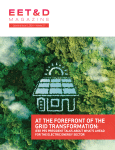The need for a sustainable and reliable energy system has never been more urgent. The world’s energy demands are growing, climate change is worsening, fossil fuels are becoming scarce and the current energy system, which is centralized and controlled by large utility companies, cannot meet the world’s evolving demands.
A new concept is emerging that can better distribute power generation, storage and management to local communities – a decentralized energy network.
Decentralized energy networks do not rely on a centralized power generation infrastructure. Unlike traditional centralized energy grids, which rely on a single source of power generation, decentralized energy networks involve multiple energy sources, like solar panels, wind turbines and microgrids. These distributed energy resources (DERs) are interconnected to form a network, allowing the optimization of grid operations. A decentralized energy network aims to put energy production closer to the site of energy consumption.
The role of Web3 in decentralized energy networks
The foundation of decentralized energy systems is Web3 – also known as the decentralized web. By leveraging the principles of transparency, decentralization and peer-to-peer transactions that underpin Web3 technologies, decentralization energy networks can lead to a more resilient and sustainable global energy ecosystem.
Decentralized energy networks can not only play a significant role in helping achieve global energy targets but can also create new opportunities for countries that are less economically developed and more reliant on fossil fuels.
Let's further explore some of the benefits of decentralized energy networks.
Building resilience
One of the key advantages of a DER is its inherent resilience and reliability. Unlike centralized grids vulnerable to single points of failure, a decentralized network comprises numerous DERs such as solar panels, wind turbines and microgrids. These DERs operate independently, reducing the risk of widespread outages.
What is more, decentralized networks empower communities to become more self-sufficient, enabling them to generate and store energy. By embracing this localized approach, regions can become less dependent on long-distance transmission lines, mitigating the risks associated with transmission losses.
Environmental advantages
Decentralized energy networks offer significant environmental benefits. Because Web3 technology facilitates the tracking and verification of renewable energy generation and consumption, through the use of distributed ledger technology, renewable energy systems can securely record and verify energy production and usage data. This transparency ensures the integrity of renewable energy certificates, incentivizes renewable energy production and enables accurate carbon accounting.
By generating clean energy at the local level, communities can lower their carbon footprints and contribute to global efforts to combat climate change. Moreover, decentralized networks enable integrating energy storage systems, such as advanced batteries, which help balance supply and demand. This flexibility optimizes energy usage, reduces wastage and further enhances sustainability.
Economic empowerment
Decentralized energy networks have the potential to stimulate economic growth and create job opportunities. This shift towards local energy production retains energy spending within the community, bolstering the local economy. Furthermore, decentralized energy infrastructure deployment, installation and maintenance require a skilled workforce, leading to job creation in various sectors. From technicians and engineers to project managers and researchers, decentralized networks can generate employment across the energy value chain.
Efficiency and optimization
In a decentralized energy network, localized power generation and storage enable greater energy efficiency and grid optimization. Energy efficiency improves by minimizing the need for long-distance transmission and reducing losses associated with centralized energy systems.
Moreover, decentralized systems can leverage smart grid technologies, allowing for real-time monitoring and control of energy consumption. These systems enable demand response mechanisms, empowering consumers to adjust their energy usage based on price signals and grid conditions. The result is a more efficient and dynamic energy ecosystem that effectively manages peak demand, reduces strain on the grid and minimizes the need for costly infrastructure upgrades.
Web3-Driven energy transition enablement in practice
To bring these benefits to life, let’s consider a real-life use case: Energy Web, a global non-profit organization that builds open-source technology solutions for energy systems implemented a decentralized technology designed to optimize energy services and accelerate the decarbonization of the grid.
By taking advantage of the benefits of Web3 technology, including decentralization, interoperability and scalability, Energy Web can now enable its clients to connect to the ecosystem easily, enhancing transparency and enabling democratic decision-making by ecosystem members via decentralized governance votes regarding significant development decisions.
This example signifies an important milestone in advancing the potential of decentralized energy networks. With Web3, Energy Web can extend the reach of its technology and drive global change in the transition to clean energy.
As Web3 continues to evolve, its integration into decentralized energy networks holds tremendous promise for unlocking greater efficiency, grid optimization and seamless integration of renewable energy resources.
This example signifies a significant milestone in advancing the potential of decentralized energy networks and underscores the transformative benefits they offer. By combining the power of Web3 technology with the inherent advantages of decentralized energy networks, we can create a sustainable and resilient energy future.
From enhanced resilience and environmental advantages to economic empowerment and efficient grid optimization, decentralized energy networks hold immense promise in revolutionizing our energy production and consumption approach. By leveraging the power of Web3 technologies like blockchain and smart contracts, we can accelerate the transition to a resilient and sustainable energy system that will benefit individuals, communities and the planet as a whole.
 Alan Vey is the founder & chairman of Aventus, a technology company that onboards enterprises to Web3. He completed his undergraduate degree in computer science and Master's in artificial intelligence at Imperial College London.
Alan Vey is the founder & chairman of Aventus, a technology company that onboards enterprises to Web3. He completed his undergraduate degree in computer science and Master's in artificial intelligence at Imperial College London.







